#kryptonian diaspora
Explore tagged Tumblr posts
Text
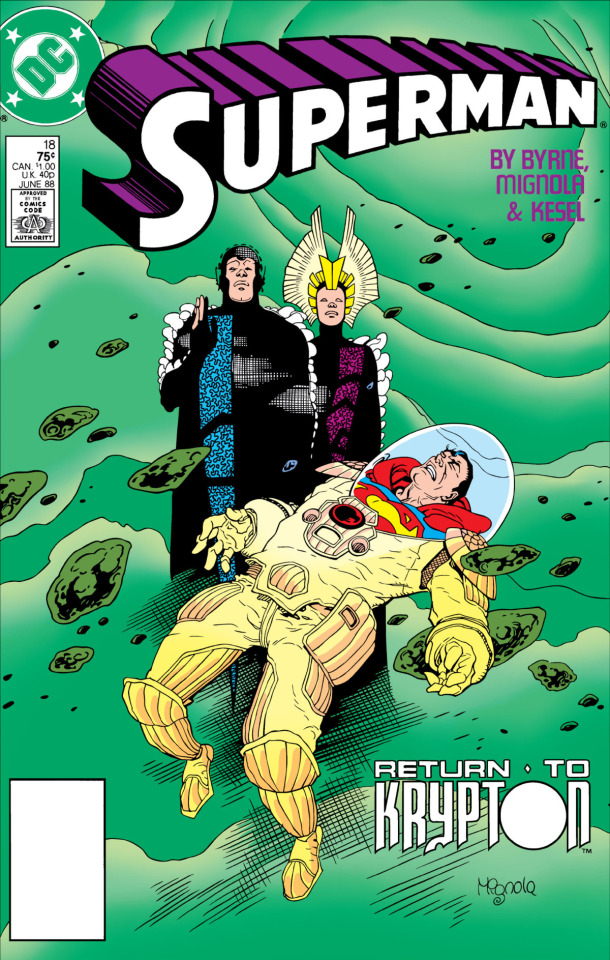
June 1988. 1988 was an extremely ugly year at DC, marked by gratuitous brutality on nearly every front. Not content with his vile take on Krypton in the WORLD OF KRYPTON miniseries (which could be summarized as "sci-fi blood libel"), John Byrne took the time to explain unequivocally that the ugly nativist implications of MAN OF STEEL were no accident.
In this issue, illustrated by Mike Mignola and Karl Kesel, Superman returns to Krypton with the help of Hawkman and Hawkwoman, and finds that it's now a planet-shaped mass of highly radioactive Kryptonite debris. Determined to search for "some trace, some artifact remaining of the race that bred me," Superman borrows a Thanagarian battlesuit and ventures out into the debris field, where the overwhelming radiation causes him to hallucinate an alternate reality where Jor-El found a way for the people of Krypton to survive their world's destruction and emigrate to Earth. This fantasy is narrated in the first person by Jor-El (in the form of excerpts from an imaginary journal), presenting a horrifying, frankly fascistic vision of malevolent immigrants, evil mothers, and populist genocide.
If you've read MAN OF STEEL, much less WORLD OF KRYPTON, it will not surprise you to learn that Superman's fantasy of Kryptonian survival and emigration very quickly turns ugly. As Jor-El's imaginary journal narrates:

In pop culture, the alien invasion story typically represents the fear of the violence of settler colonialism coming home to roost in the imperial core, and you could hardly ask for a more textbook example than this: The refugees from Krypton begin (re)building their own civilization over inhabited human cities, while relegating humans to reservations or concentration camps. Such a fantasy also fuels the delusion of self-indigenization, where settlers appropriatively define themselves as indigenous to the lands they or their ancestors have stolen. This is of course primarily a white fantasy; while the post-reboot Superman books did introduce a few Black and Latino characters, note that there's not a single person of color visible among the humans being interned. Note also that Byrne takes the opportunity to restate the fascistic thesis presented in MAN OF STEEL — that Kryptonian culture is corrupt because Kryptonians have "lived all their lives in isolation, denying their physical beings" in favor of technology and modernity.
That's not all, though. For one, you'll notice that Jor-El also describes as suspect the decision of some of his fellow immigrants "to live apart … to keep themselves aloof from the citizenry of our adopted world"; he acknowledges that the settler colonialism is worse, but he regards cultural self-isolation as inherently bad in its own right. Also, note that the Kryptonians rename Metropolis "New Kandor." As Byrne was most certainly aware, in pre-Crisis Superman lore, Kandor was the former capital of Krypton, stolen and shrunk by Brainiac and later recovered by Superman, who kept the bottled city in his Fortress of Solitude until he was able to find a way to permanently enlarge it. Kandor was, fairly explicitly, a Kryptonian ghetto: a closed Kryptonian community with rigidly defined borders, delimited both physically and by a set of complicated rules about who could enter or leave (and how), within which Kryptonian culture continued more or less as it had for centuries. What Byrne is saying here is that such (literally) ghettoized communities are intrinsically suspicious — that the inability or unwillingness to assimilate is categorically indicative of malign intent. The only virtuous decision for an immigrant or refugee, then, is to choose total and unconditional assimilation, as Superman does at the end of MAN OF STEEL and Jor-El subsequently does here:

Moreover, it's not enough for Jor-El to simply choose to become an Earthman (and implicitly an American); he must also "stand against [his] own race." As the fantasy continues, Jor-El creates synthetic Kryptonite and kills thousands of Kryptonians, forcing many of the survivors to flee into space. Since all of this is a hallucination in Superman's head, the version of Jor-El here represents Superman essentially imagining himself in his father's place, but in case that wasn't clear enough:
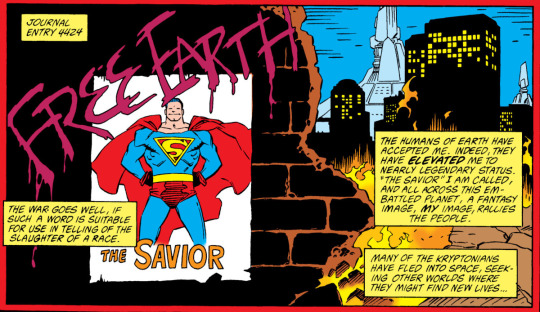
Jor-El does not, so far as we're shown, actually don the Superman costume, but he has expressly taken on that role, which in this case means becoming an explicitly genocidal populist champion. This is not hyperbole: Jor-El "rallies the people" against the evil Kryptonian elite as he carries out "the slaughter of a race."
The final conversation between Jor-El and Lara in the first issue of MAN OF STEEL had painted Lara in a rather negative light; while Jor-El is valorized for his rejection of Kryptonian values, Lara recoils from a vision of the "savage" people of Earth and hopes that their son will show them "proper Kryptonian ways." The unsavory connotations of that conversation (to which Superman could not possibly have been privy) play out even more explicitly in the climax of this fantasy:

In short, Lara becomes the ultimate embodiment of almost everything bad about Byrne's reimagined Krypton. This plays almost like a throwback to the pop psychology of the 1950s and early 1960s (when Byrne was a child), which held that the maternal role had to be carefully regulated, since over-mothering could be just as psychologically damaging as maternal neglect. Perhaps the ultimate satirical exponent of that philosophy in pop culture terms is THE MANCHURIAN CANDIDATE, but it was a common piece of conventional wisdom, expressed here without irony. Lara's final act of villainy is the corruption of Kal-El himself, since in this fantasy, Jor-El has not been able to "save" their son from Kryptonian degeneracy. (Note also that Byrne restates once again his revisionist contention that Kal-El was conceived on Krypton, but actually born on Earth.)

While Jor-El is not wearing a Superman costume in these pages, he is wearing a costume of sorts, an outfit that evokes both Doc Savage and Hugo Danner, the hero of Philip Wylie's influential 1930 novel GLADIATOR, two pre-Superman supermen of the 1930s. Around the same time this issue was published, Roy Thomas was integrating GLADIATOR (which had entered the public domain) into DC continuity in YOUNG ALL-STARS, whose central character Arn "Iron" Munro was Hugo Danner's son. (Munro's usual outfit was a black T-shirt over white trousers, the inverse of what Jor-El wears here.)
Jor-El's scream of anguish marks Superman's return to consciousness, so the fantasy ends at this point, and the Hawks help Superman return to their ship. Superman then provides the following summation of what we've just seen:

Since Superman's fantasy was a hallucination induced by radiation poisoning, one could potentially shrug off its ugliness as just a bad dream, but Superman rejects that, saying, "I'm afraid my vision was accurate," at least in its moral and political implications.
Of course, the principal authorial intent here is to reject and dismiss the Superman continuity Byrne had recently erased, in particular the previous Kryptonian diaspora, but the thesis of this story is perfectly consistent with mainstream American, Canadian, and European attitudes on immigration: Any immigrants or refugees must assimilate, promptly and completely, and those who don't, for whatever reason, represent a dire threat to the polity that must be met with expulsion or annihilation. If the number and/or nature of the immigrants does not allow for prompt assimilation, lethal violence — up to and including genocide — is not only appropriate, but a moral imperative for the survival of the imperial state and/or the "white race" [sic]. There are many people in the real world who expressly believe that, so it's not necessarily surprising to see it expressed so bluntly in a Superman comic, but it is very ugly.
This story was unfortunately not the end of it, so far as Byrne and Superman were concerned. While the fantasy sequence here amounts to Superman picturing himself as his father, the heroically genocidal champion of an imagined reality, it is still just a fantasy, even within the context of the superhero comic narrative. It therefore leaves unanswered (at least for Byrne) the question of whether Superman would actually be willing to commit murder and/or genocide to protect the Earth from others of his kind.
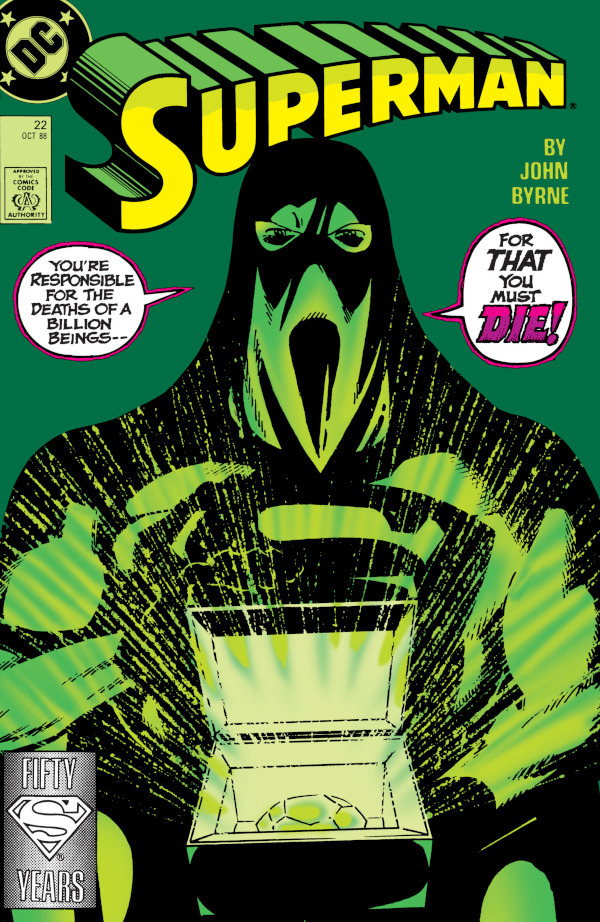
Since Byrne had taken pains to ensure that there were no other living Kryptonians — the only other was the Superboy of the Pocket Universe created to reconcile MAN OF STEEL with the Legion of Super-Heroes, who was already dead — he was obliged to invent some for the purpose. About three months after this issue appeared, Byrne's final storyline (in SUPERMAN #21, ADVENTURES OF SUPERMAN #444, and SUPERMAN #22) introduced three facsimiles of pre-Crisis Phantom Zone villains in the Pocket Universe, whom Superman finally executes after they have completely depopulated the Pocket Universe's Earth (also conveniently ensuring that that world couldn't be used to provide any kind of end runs around post-Crisis continuity, and giving Byrne the opportunity to grind his heel on the earlier Superman mythos one more time).
With that story, the reactionary throughline Byrne had begun in MAN OF STEEL was complete, establishing not only that Superman was now a true-blue, American-born native hero, but also that he was willing to kill other Kryptonian survivors to defend his adoptive white Gentile American culture. "Yikes" doesn't begin to cover it, I'm afraid.
#comics#superman#john byrne#mike mignola#karl kesel#krypton#kryptonite#jor el#kryptonian diaspora#this is one of the most unpleasant superman stories ever#its politics are utterly rancid#i'm still inclined to think world of krypton is worse#but it's a different part of the same horrifying thesis#genocide cw#antisemitism cw#xenophobia cw
22 notes
·
View notes
Note
ok but like chris was revamped to be evil due to eugenics so
like I think it's fair to complain about a former abuse victim named after someone who played superman being a villain simply to make a biological son have a villainous rival.
plus a lot of "superfam" posts are actually 'kent family" posts
that being said, more people need to read Steel, and all of both john and Natasha's appearances.
if this the post ur referencing

i dont think ive ever said anything abt wanting chris to be evil just that he doesnt exist anymore thats not an embracement for lor z0d. wanting chris back vs having lz now — both are a separate subject to the fact he's included more than CURRENT canon family members. we can do better than trying to fix dc editorials xenophobia w fandom racism n exclusion 😭
#ur first line is kinda blowing me bc what if i told u lets dig deeper...chris as a concept was a form of xenophobic exceptionalism..🤔#lets not just start n stop at his current self dc cldve introduced a memorial kryptonian kid in the 2000s without defaulting AGAIN#to homeworld kryptonians = evil except for clark kara n whoever they can influence. but they did so: why?#this drags even into the kandor expansion/new krypton saga two years later#which ends in NK getting blown up bc again fuck the homeworlders ig#thats why i liked the phaelosians (however u spell it) thaola the twins n other kryptonian diaspora pkj introduced#but ANYWAYYZ see how once again we embodied the fandom issue the og textpost was abt the steels n were here talking abt chris 😭😭🤔
20 notes
·
View notes
Text
I'm more and more taking suspicion in the twins being excluded from superfam stuff in favor of chris and the like, considering PKJ stated he wanted to keep them kind of ambiguous racially and how their mannerisms and struggles are explicitly based off transcultural adoption.
Like. Gee. Why do you want the kid Clark adopts to only be from a similar cultural background to him?
#Your reminder that the phaelosians are not only a diaspora of kryptonians#But they are explicitly oppressed for it#So like. Watch how you talk about that please?#dc#anti chris kent#salt posting
9 notes
·
View notes
Text
Observations on Kryptonians:
Their Biology, Behavior and its Dynamic with Beauty
An anecdotal entry by Bruce T. Wayne, regarding his experiences with the Kryptonian People.
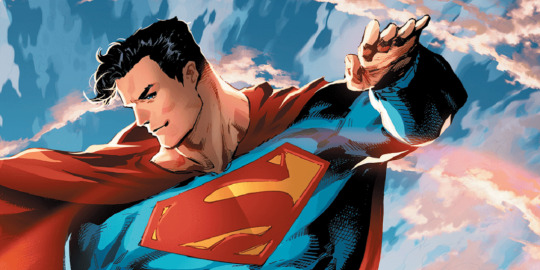
Over the course of the last century, Earth and Humanity has become aware that not only are we not alone in our universe- but that we are not alone on our world. At an undisclosed moment in our history, our homeworld became a refuge for the last children of Krypton, a world that was lost to unknown disaster.
Kryptonians are mysterious and alien, a recipe for rejection and prejudice on this planet. Not only this, but they have exceptional powers, which lure our worst impulses of greed and exploitation. We have not always treated them with kindness.
Despite our own lack of humanity, the most notable Kryptonians of our society continue to share their unique gifts and perspectives, choosing to help wherever they can.
As a Jewish man, and a Father, the legacy of the Kryptonian people, both in entrusting our world with their children, but with it, their future in the face of diaspora, humbles me.
I would like to offer my voice of support to our kin from beyond the stars. I have some personal experience with Kryptonians, and will attempt to demystify their habits and nature, to present them to you not as strangers from the skies, but as part of the infinite diversity of our world.
Not to be feared, not be used, but to be welcomed.
ברוכים הבאים לבית שלנו
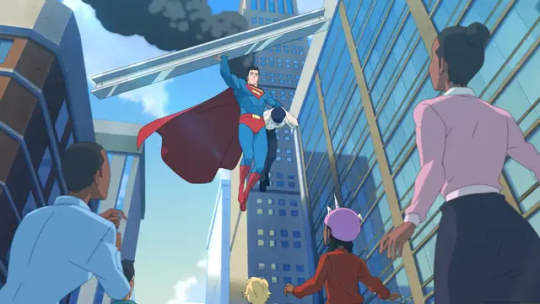
Caveat on Kryptonian Powers
Most discussions of Kryptonian biology begin and typically conclude with a long list of the powers typical to Kryptonians. These powers are considerable, but are generally used to justify how they are treated. There is no value in me lingering on this much-speculated aspect of our Kryptonian kin.
Instead, I would like to discuss the lesser known traits that I have found to be personally charming.
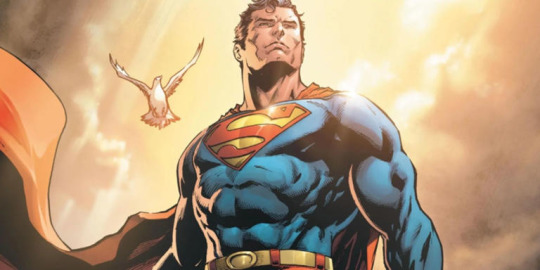
Diurnalism and Sun-seeking
Kryptonians are naturally diurnal by nature, and are drawn to sunlight. When relaxed, they enjoy basking in our sun's warmth and when injured, or unwell, should rest in either natural sunlight, or be placed near a sunlamp.
Many Kryptonians display a tanned or dark-skinned complexion, which I found initially counterintuitive since it indicates protective melanin in Humans. In a Kryptonian, this coloration is actually indicative of stored solar radiation. In layman's terms, it's a sign of good health in your local Kryptonian.
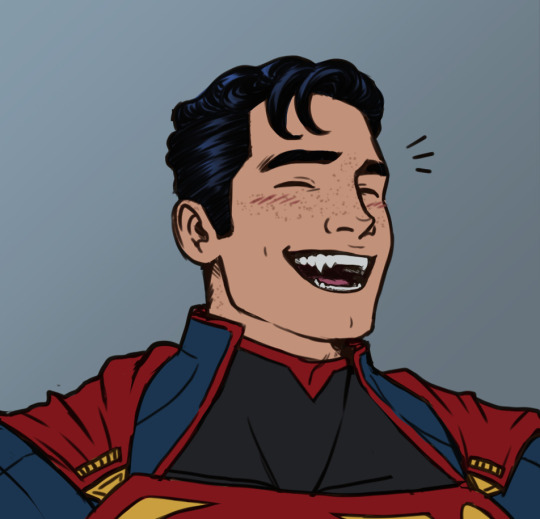
(Art credit to @domnorian, please support the original work here, it is used here as an example)
Dentition and Diet
The intense demands of the Kryptonian body are supported by an incredibly high metabolism. Although they are primarily sustained by solar radiation, they can and do display a remarkable appetite. This energy is readily burned off by their bodies, so it should be considered offensive to shame or draw attention to how hungry a Kryptonian may appear to a Human.
Instead, attention should be paid to the variety of their diet. I have concerns that Kryptonian nutrition is not necessarily met by traditional human foods, and believe that supplements of various metals, sillica and crystalized minerals may be of great use to them. Further research is indicated, but consider they may not be fully satisfied.
This viewpoint is supported by the Kryptonian dentition, which features a diminutive but handsome set of fangs. As this is one of the more readily visible distinguishing features, some Kryptonians experience self-consciousness when smiling.
If it is of comfort to any Kryptonians reading this, Humans enjoy 'teefies' and like to remark upon the canine teeth of our companion cats and dogs. We find it 'cute'.
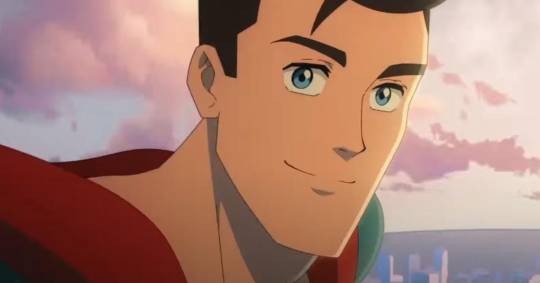
Ocular Notes
It has come to my attention that Kryptonian vision is more specialized for use during flight. It has great telescopic capacity, amongst its other various modes, but this can put them at a disadvantage in our society. Being so far-sighted, Kryptonians may struggle to read letters, smaller signs and newspapers without assistance.
If you see a Kryptonian puzzling over a piece of paper, and holding it at arms' length, any offers to help should be gently made. However, Kryptonians are notoriously friendly and inclined to offer help as much as receive it. You may well make a new best friend. In fact you probably will. Statistically.
A smaller note is that Kryptonian eyes- on account of the multiple facets to their vision -all appear to be a unique type of blue. This particular shade is potentially a generative emission of scattered sunlight, though it would require more detailed research and a far longer examination on my part to confirm.
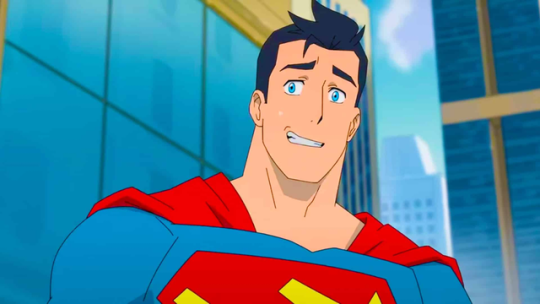
They Purr
Yes, it is true. Kryptonians purr. It is a delight to listen to.
From my observations it seems readily triggered by the presence of children, or a desire to comfort others. As well as by their own contentment, whether physical, emotional and often both.
The frequency of the oscillations seem to differ between the two circumstances, supporting my current theory that this purring is both a form of communication, but separately resonant to encourage bone growth and soft tissue repair in the sick and injured.
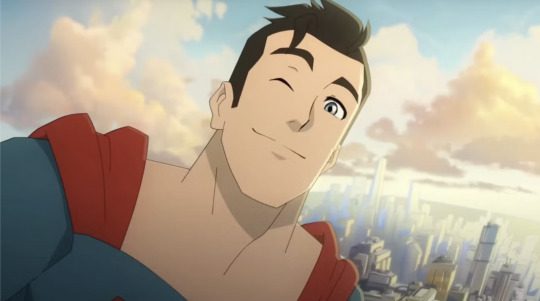
Reproduction and Courtship
Having not conducted a relationship with a Kryptonian, I speak from a limited capacity of research. That said, to Humans looking to court Kryptonians, they appear to be receptive to forms of lip contact, and saliva exchange.
Further erogenous zones are speculative, but there is marked sensitivity along the length of the throat and just below the occipital bone.
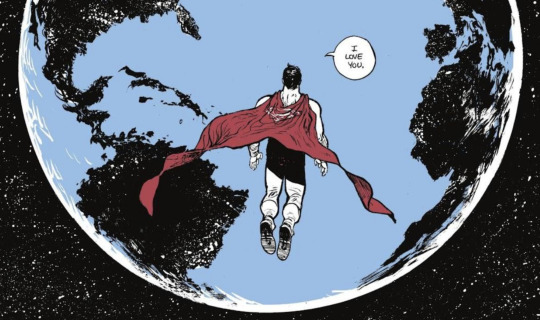
Love
I put it to you that Kryptonians are not powerful - they are uniquely vulnerable. An endangered culture and people who have shown us compassion alone. They deserve our protection and understanding.
This is the only home they have ever known. They are not strangers from the stars, they are our friends sharing the same sunlight.
They love us. We should love them in return.
B.T.W
PS. @official-clark-kent I am no reporter, but I did enjoy trying my hand at a small thinkpiece. Perhaps we could go fishing sometime?
265 notes
·
View notes
Note
If you had to rank all the justice league fams ( superfam, batfam, martianfam, etc ) from least favorite to most favorite, how would you do it ?
Ooh I'm not familiar with all the cape-fams that well so I don't know how much of a proper ranking I can do, so here's just a random vibes tier list:
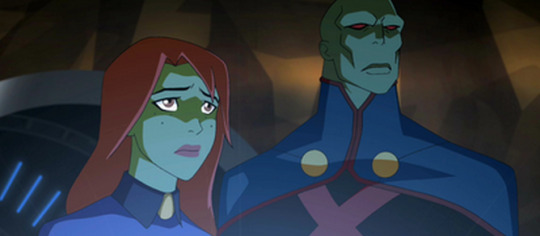
Martianfam: In canon (i guess this consists of just J'onn and M'gann, Jem if we're reaching), they're a mess. I'll save this for the 2nd part of the upcoming Ma'al essay, but Martianfam's biggest problem is having undefined relationships that don't take advantage of a proper family dynamic. Canonically F tier. However,,,I'm obsessed with my version of Martianfam so that bias puts Martianfam in theoretical S tier.
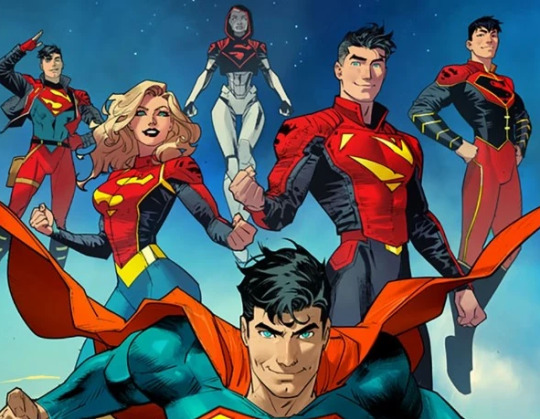
Superfam: So much potential in this fam to be generational immigrant/diaspora angst and tension only for canon to be so uncreative with the legacy characters (minus Kong Kenan). This fam suffers from overreliance on clones and alternate universe versions of existing characters tied to Clark's Kryptonian genes (the adopted twins, Kong, and the Steels are a good change of pace). Jon and Conner (and sometimes even Kara) are suffering being, what I like to call, a "Clark Kent factory product". They're too scared to make these boys different from dad. Conner Superboy is in limbo with Jon taking over. What is going on with Powergirl being infantilized now. However,,, if the immigrant allegory was critically applied to Superfam? Theoretical S tier. Canonically C tier.
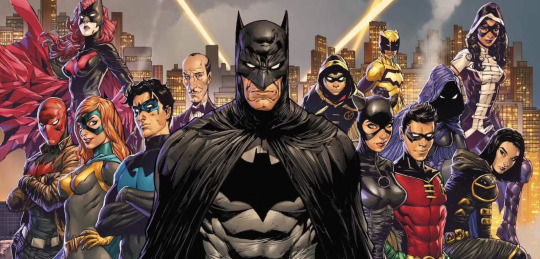
Batfam: Undoubtedly the strongest of the cape-fams in DC. Even with their flaws and how they've been modernized, this is still the blueprint. What's there cultivates an intense fanbase and there's such a diversity in the backgrounds of each Batfam member and how they evolved. Each member has a unique relationship with Bruce, many characters are capable of sustaining their own solos, they have relationships with each other, gosh it's a lot. I'm affectionately putting this in A tier, shaving some points off for stuff like erasing Babs' disability, characters like Steph but especially Duke being sidelined, the girls being infantilized as the boys get to grow into men, whitewashing Damian, etc.
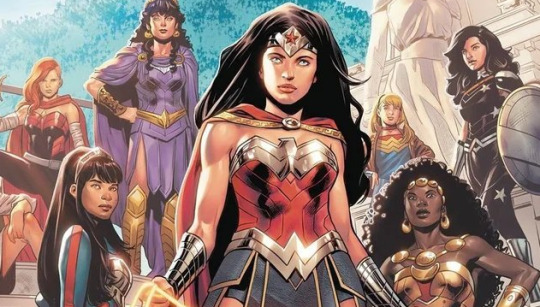
Wonderfam: I can only speak based on vibes here, but gosh you deserve so much better, Wonderfam. I feel like each member should deeply explore a new facet of womanhood different from Diana to freshen up each time a new legacy character joins the Wonderfam (Nubia's great at this from what I've seen). I love that this fam includes Themyscirans and sometimes ordinary girls (even if that gets retconned a bunch). I eyeroll from a distance whenever it's really obvious that the male-dominated writers of DC try adding men into Wonderfam as a means of focusing attention away from women (cough Diana's bro). But also. Kick Trinity out of Wonderfam. I have never seen a character so universally behated but I get it. Unfortunately D tier. I want better for this fam though.
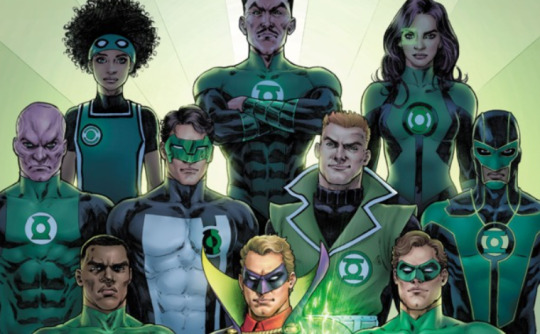
GL fam: Really good! They're a unique fam in that being a part of the GL corp means being a part of the fam, so you get people from all sorts of backgrounds that don't have to be related to a main character. Theoretically this can even extend to other lantern colors whenever the GLs team up with baddies like Razer or Sinestro. You can arrange different groups or pairs of GLs to form their own Star-Trek esque team. And that's such a fun time when that happens. I'm not in GL fandom enough to know the nuances of some narrative flaws or anything, so I'm giving the GL fam a vibes based S tier. They just work! And they're unique while doing it.
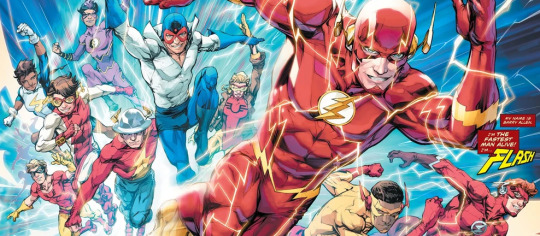
Flashfam: I can only speak based on vibes here but whatever's going on with Flash fam just looks like such a fun time. From what I've seen and read, so many of the characters are funny and endearing. I love that there are many twins in this fam. That's just a bias for me. My biggest nitpick with Flashfam is that it suffers from over-convoluted origin stories. That's kind of a problem baked into the dough when your powers intersect with time travel, but it adds a layer of inaccessibility when some of the character's backstories are so convoluted. Vibes based B tier.
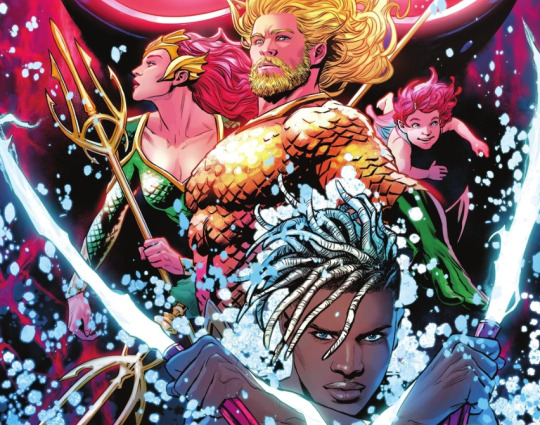
Aquafam: Mostly vibes based impression again since I don't really go here but I've met the characters a good amount of times. Arthur has a special theoretical space in my heart as someone borne of two cultures. We're here for that mixed diaspora struggle. I enjoy the rivalry he has with his brother, I think Mera has a lot of potential as a love interest and wifeguy (and she has an evil twin so, bonus in my book), and aquababy. Hah. I enjoy the many ways Aqualad has been reinterpreted across media. However! Kaldur/Jackson is definitely the most interesting addition to the family, imo! I'm all for villains or villain-adjacent characters being on Team Hero. I also like Black Manta. Petty baddie we respect. Uuh vibes based B tier. I'll theoretically bump this up to S tier if all Aquafam members walked out of the ocean to the H20 "Just Add Water" theme song.
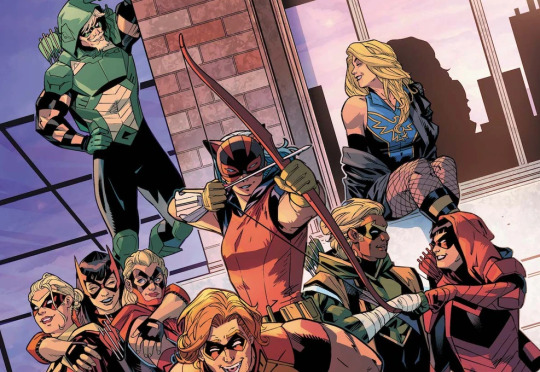
Arrowfam: I'm embarrassingly unknowledgeable with Arrowfam members so we're doing vibes. On vibes they're like Batfam adjacent but sound way more interesting. Oliver Queen is a great messy character, and I like seeing each member have a different complex relationship to him. I'm very endeared to Roy/Arsenal/Speedy, his villain will-they-won't-they romance and baby dad plot is inherently interesting. I also love Connor Hawke!! Blasian ace king fr. And I adore Black Canary. She has so much going on and still checks in on this fam too. Idk if it's controversial of me, but A tier based on vibes.
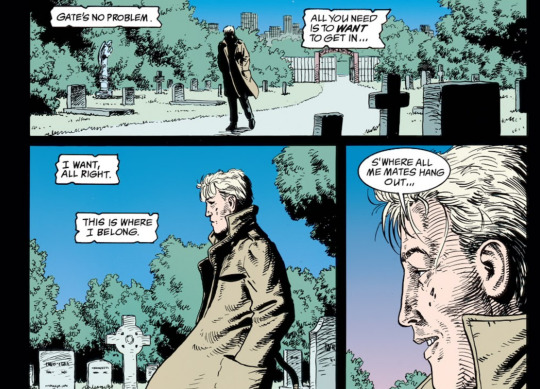
Constantinefam: SIKE this loser doesn't have friends or family they're all dead. S tier. If DC is pushing DC!Johnstantine into a family or partnership dynamic with JL Dark, Zatanna, or Xanthe Zhou? Theoretical F tier.
Haha this was fun to write, thank you for the fun ask! Nice to ramble about the various fams of the DC world.
#askjesncin#jesncin dc meta#of sorts...very opinion subjective based thing#fun to write to get my brain to wake up this morning. ty.
60 notes
·
View notes
Note
krypton discussion hell yeah!! i definitely think language preservation would be one of the key factors of keeping the kryptonian identity alive for clark and kara. as a child of immigrants there’s a grief to being removed from your homeland, even if you didn’t grow up connected to it for most of your life. the sense of not belonging where you are as you navigate the world takes a toll on your sense of self. for clark, knowing that there’s so little left of his heritage to preserve must be painful, even more so for kara who actually lived for years with a planet and people that no longer exist. idk i guess i wish we could see more of this explored in dc media. diasporas typically have an inherent tragedy to them
I agree 100% anon. There's so much to explore with a diaspora lens within Clark's character and Kryptonian lore in general. He and Kara are similar in so many ways, but often their own origins draw a stark contrast between them, because Kara knew Krypton, and Clark never did -- and those experiences both come with their own pains and joys. And they are both the future of Krypton -- because they have to be.
What happens if Kara or Clark never have children? What if Clark never learned Kryptonian? Whose responsibility is the weight of an entire culture and history? Is it fair to expect him and Kara to bear that burden?
#also the inherent jewishness of his diaspora origin story#can't forget that#dc#dc comics#superman#clark kent#kara zor el#asks#anon
49 notes
·
View notes
Text
AND ANOTHER THING
lmao ok so i briefly mentioned the kara zorel vs kara danvers via this original ask meme from @sideguitars, and a comment from @moistvonlipwig where kara reveals being an alien but not supergirl. and i've actually mentioned a little bit of kara identities in this reblog i made. anyway the thing is that of the 2 identities, this should have been the central thesis of the show: who is kara? is she kara danvers or is she kara zorel. supergirl is the name of the show and is the hero. but most notably, she is the conduit through which kara determines who she is (danvers vs zorel), but supergirl is her job. just like clark's job is superman. so yeah.
her complicated relationship with krypton, with her parents, with alura, with mon-el, with alex, with lena, and even with clark all stem from kara traipsing between danvers and zorel. supergirl just happens to be the manifestation of kara's alienness and the singularity of her existence as a superpowered alien. honestly her superpowers could literally be that her coffee always tastes good and she's always right on time for the bus when she reaches the bus stop and all of that could be attributed to the fact that she's an alien, not because she's a superhero. like it's her kryptonian heritage, and therefore that aspect of her alienness, that impacts and colors how kara interacts with the world and how she reflects on herself.
supergirl is one facet of her alienness. so i think that for the kara identity to really be explored in the show, it should have been about how kara wants to shape who kara danvers is as a person of the world, a human identity, versus who kara zorel is as a superhero vigilante named supergirl, an alien identity. she bears the brunt of responsibility to protecting those around her because her parents fucked her up bestowed that responsibility on her shoulders to protect kal. and because her cousin had already brought on this superhero vigilante identity, it only makes sense that kara considers it for herself. she has the same powers as her cousin.
so the issue of authenticity re: her identity should be about who is kara being most loyal and most faithful to. and not to supergirl. supergirl is a costume, she is a persona, she is a representation of her values and beliefs. when kara asked james to betray lena's trust and tarnish their relationship in the name of ensuring that kara is not at risk of kryptonite, it's the supergirl mouthpiece, but it's kara zorel the alien who is panicking and making rash decisions. when kara is the one who tries to stop lex by any means necessary and accepting that she may very well die despite lena wanting her not to sacrifice herself, that's kara zorel the alien who is making that decision because it's up to her, as a superpowered alien who has the best opportunity to catch lex.
so it's danvers vs zorel. is she focusing on her roots as the last daughter of krypton, an alien refugee? or is she focusing on developing her human identity, the one who works a regular job, who has a rent-stabilized apartment, the one who has to pretend to not have inordinate levels of strength and powers so that people see her as average and totally regular and not at all remarkable? which skin is she most comfortable in? like i said, the true reconciliation for the show, for me, with regards to kara's identity is for her to make sense of her racial (species?) identity. the marginalized experiences that the show harks to isn't really about queerness so much as it's about the racial diaspora.
so i think if i could rewrite the ending of the show, then i think it would have been more poignant if kara came out with an article that she's an alien and it's through having lived in the shadows and having to hide that identity that gives her a unique perspective on what it's like to 'pass', to benefit from certain privileges, to experience the world in the way that she has been.
it's through the reconciliation of being kara danvers and kara zorel that could have catapulted kara to be her 'full self'. supergirl is not who she is, it's what she does. so the combination of those 2 identities that will give credence to how important it is to understand the role that both play in her life. to uplift other voices, to give them space to exist, to help make changes at the grassroots level that can enact change. fighting crime and fighting bad guys is well such a specific choice of life decisions. she is, of course, equipped to do it, being the most powerful being on earth. but supergirl is not who she is. it's who she puts on. which implies that it's something she takes off. but she cannot turn kara zorel off. she is forever an alien. and even the idea of kara in argo or just generally off world, the sense of belongingness is put into question because what is her identity in those places? how alien is she as kara zorel up there? how alien is she as kara danvers up there?
i guess the point im trying to make here (badly and haphazardly) is that if they really wanted to push for a 'full self' of kara so that she does not have to 'choose' between one or the other, she needs to contend with the fact that she's an alien, not a superhero. is she accepting of that identity? she has powers, yeah, but does she understand what it means to be an alien in national city? what about those without powers? does she feel foreign and alien to them also? just like an immigrant filipino american person who has grown up fully assimilated into american culture and never having any kind of connection to her filipino identity until now; how does that color her perception of being filipino and american and being, specifically, a filipino american? like do you see what im saying?
also, how does kara danvers, regular person reporter/eic, intertwine as kara zorel, alien refugee who also happens to be hulked out with powers? because its understanding how they work together and what their strengths and limitations are that then better inform and exercise who and how supergirl can be.
ok that's all goodbye
13 notes
·
View notes
Text
Alrighty, after taking some inspiration from the recent X Men 97 and now that the Krakoa Era is finally wrapping up, I would like taking this opportunity in explaining a sort of take on this idea of an entire nation of supernatural peoples and beings from all across the globe and giving it a….Titanic spin to it
Basically
What if The (formerly Teen) Titans have a Krakoa Arc to call their own?
Yes this idea will be based on my little Fanon universe that’s in my Pinned Post so anyways Brace Yourselves My Friends
Background: Taking place an in universe year or two after Dick and Kory’s epic honeymoon and after a more or less steady status quo for the DCU, things start escalating with a grand alliance of Planet Tamaran’s enemies from all across the Vega System reconvene once again to seize the planet for themselves. While the Tamaraneans under their Empress Komand’r are well prepared for such a threat, so have their enemies in advance with equipment and tech from Apokolips. Despite their best efforts, Komand’r and her people are deeply struggling against New God tech and it’s not too long before their enemies surround their capital demanding their unconditional surrender. Kom’s scientists though have come up with a final desperate plan which they believe can either help their people fight back against the overwhelming odds however at a great risk, a plan Kom is all too willing to go if it means saving her people from subjugation.
As such, she flies with all her great speed fully charged with her power right all the way to the Vega sun itself, the plan being to supercharge its solar output with her power inner reserves, allowing more energy to shine which should empower her people even those who didn’t tap into their starbolts like Kory and her can. While granting the entire race the ability to charge up Starbolts, the ability to legit breathe in space and other advanced powers and abilities, it all came at an extraordinary cost; the Star itself wounded up overloading and with barely time for their enemies to acknowledge it on time, it explodes into a massive supernova, taking not just them and not even just the planet itself but the whole of the Vega system.
The Tamaraneans themselves, all their civilians and even their then freed relatives managed to evacuate right on time so not one was lost in the supernova but now they have no home to come back to, leaving them a diaspora.
Meanwhile, as the Titans (nominally split into the premier Justice Titans and their B team allies though in the whole composed of Nightwing, Starfire, Raven, Beast Boy, Cyborg, Terra, Troia and Red Arrow) have numerous adventures and meet new allies across not just the universe and other planes of existence which can include the Phantom Zone, the realm of the Lord of Chaos etc, but throughout the Multiverse itself, even coming into contact and allying with the titular Titans of the Multiverse in their own quests to fix worlds with their timelines screwed over; all of it has them gaining new never wig their team and other allies but more importantly a massive influx of entire peoples as refugees and immigrants settling in the Titans’ universe for a new home. Unluckily for the Titans by the point this influx of people’s in need of new home becomes of a priority, The Legion of Doom, Lex Luthor’s team of supervillains, have launched an all out assault on their T shaped bases in both in Earth’s exosphere and in Bludhaven bay. While the attack was ultimately repelled, both T Towers were destroyed, now requiring the Titans themselves in need of a base themselves
Eventually the Titans decide on a Take out Multiple Birds with One Stone approach: with some Kryptonian tech borrowed from the City of Kandor and a location on the opposite side of Mars’ orbit (due to Earth’s orbit being occupied by Earth itself and New Krypton but I Digress lol), a massive new planet is created to be a sort of new home for all those refugees across existence and of course the Tamaraneans, Empress Blackfire acting as their representative in a high governing council which her sister and the other Titans are the ultimate authority on
While the Titans themselves are mainly tendering to Earth’s matters and small scale operations and crime fighting, this Planet shall serve as their new base of operations and the mainly settlers on it being their allies for Cosmic scale threats and crises.
Thus we present to you,
Titans Planet
For this new status quo, before the destruction of the Towers, the Titans Book (the one featuring the aforementioned B team of Troia, Red Arrow, The Flash (Wally West), Omen, Bumblebee, Herald and Jericho) would have a definitive conclusion after around hopefully 100-120 issues (bi weekly schedule applying), the team within it being consolidated into Justice Titans
Therefore in Issue #125, that’ll be a triple sized jumping on issue in which has not just that grand attack by the Legion of Doom but also the Titans consulting with the Kryrptonians of Kandor for borrowing their tech to create Titans Planet. Midway through the issue, Dick would have a bite among their members on whether to proceed with this plan or not, bringing up some differing options and raised concerns among them. Eventually the votes lean in favor of a Yes, leading to creation of the new planet in the opposite side of Mars’ orbit.
Here, Dick, Kom, Donna and Kory lay down simple ground rules for their new found headquarters/planet:
1) The core team should be addressed of tensions between peoples over land rights and other disputes.
2) No citizen of this planet should harm not especially kill another. Should they travel to Earth, they must also not kill any humans or any earthlings
3) The earthlings in turn must respect and treat these citizens of this planet as much any other earthling
4) Titans Planet Must Be Respected. Any attacks on its citizens, not the Titans themselves, but its citizens by hostile powers across both the stars and across dimensions will be a declaration of war.
As for the books that would be affected or launched by this new status quo;
- Titans (formerly Justice Titans, starting in maybe Issue #126, this book will be renamed)
- Nightwing and Starfire: The Flying Graysons (Despite the both of them still officially living in Bludhaven, the Planet especially due to the presence of Kom would serve being a platform for stories for Kory in order to diversify it from the standard Bludhaven based ones)
- Titans Planet (launching after Justice Titans #125, The Main ‘Hub World’ series which explores the day to day operations of the planet’s many people groups and factions; the only title that operates in a one issue per month schedule, Though each single issue are double sized)
- Blackfire: Empress of Tamaran (Launches after Justice Titans #125, serving as the solo adventures of Empress Komand’r as she contends with not just remnants of that alliance that ultimate destroyed her home planet but also other cosmic foes and enemies including probably up to Darkseid himself)
- Mon El: Man of Valor (Similarly launches after Justice Titans #126; Among the people groups that have settled on Titans Planet was the Daxamites who due to events in Action Comics, their own planet too has been destroyed thus they are in the need of a new home. Mon himself being a top representative on their behalf on the planet while he deals with not just a rise of potential supervillains on this planet but also his own place in this world, on Earth and in the universe as a whole in light of these events. Mon himself at this point is something of an Honorary Titan due to his stronger connections with the Superman family)
- Cyborg
- Raven
- Beast Boy
Future event comics and crossovers that involve these books can still occur though the status quo remains for a lengthy amount of time in real life. At the bare minimum, it should last between 2-5 years before another massive shake up can occur.
For any constructive criticism, compliments or additions, Please Reblog and/Reply if you can. It’ll be greatly appreciated
#dick grayson#koriand'r#rachel roth#garfield logan#victor stone#tara markov#donna troy#roy harper#reboot#Justice titans#komand'r#tamaran#mon el#titans planet#daxam#mention#x men 97#krakoa#teen titans comics
8 notes
·
View notes
Text
This post is inspired by the “who’s even left of the Noldor” post I reblogged yesterday.
What’s up with purposeful destruction of cultures as a plot point in speculative fiction? Because now that I’m thinking of it, so many fantasy and sci-fi settings have a last survivor of a long lost race or a destroyed planet or lost precursors. Sometimes those precursors were just lost to history, but there’s also a whole lot of genocide and attempted genocide.
The first thing that comes to mind is Voltron, where Altea is destroyed as an act of war 10,000 years (an absurd amount) before the story and a huge amount of the plot centers around what’s left. (Not much, as it turns out. The Alteans left behind some mechs, 2.5 people, lost lore, and exactly one oppressed settlement discovered in season six). There’s the MCU, where the Skrulls are a poorly managed metaphor after the destruction of their planet scatters them across the universe, and the Nine Realms side of the franchise has three separate planet destroying incidents that are either attempted or successful. Plot and directorial inconsistencies reduce the asgardian population from a massive city to a fishing village, and no one cares. Superman is one of the last Kryptonians. Adora is the last of the First Ones. Aang is the last airbender. These are all children’s stories.
Why? Why do we tell our stories like this? Why are our protagonists othered in such a specific way that they have no one to turn to but ancient lore and a final recording? Why are the precursors all dead, and yet their inventions are better than anything modern civilizations can ever make? Why is destroying an entire civilization always the way that war goes? Why is there hardly ever a diaspora or cultural memory of the lost civilization?
Is American society built so solidly on a foundation of colonialism, genocide, and worshipping the good old days that we not only can’t imagine worlds without it, but consistently imagine worlds where that annihilation of culture and identity is more successful? Because in the real world, groups of people don’t just disappear, no matter how much others want them to.
I know there are exceptions, deconstructions, and works that don’t fit this idea. Superman specifically is old enough to have helped define the trope, and has specific cultural background. I’ve just been thinking about universes defined by what they are missing.
6 notes
·
View notes
Text
All these things (that I'll never know)
read it on the AO3 at https://ift.tt/4Cl5P3G
by Paintedqueen
"It’s like a flip has been switched in his brain, making him uncomfortably conscious of Kryptonian status. Before, when he was younger and still so new to the world, it was the only identity he had, one of the few consistent facts about him.
There have always been two constant truths about Conner Kent. Truth number one: He is Superboy. Truth number two: Conner “Kon-el” Kent is a Kryptonian clone.
And that's it. That's all there was to him. But now he's spent years desperately trying to find an identity, clawing onto anything he could have, to forge something that was just his. So much so that he's only thought about what he could become, not what he already was. And so in the darkness of his room, the moon shining through his open window, he considers what that means. " ---------- Or, Kon-El's journey on what it means to be Kryptonian.
Words: 12796, Chapters: 1/1, Language: English
Fandoms: Superboy (Comics), Superman - All Media Types
Rating: General Audiences
Warnings: No Archive Warnings Apply
Categories: Gen
Characters: Kon-El | Conner Kent, Kara Zor-El, Clark Kent, Jonathan Kent, Cissie King-Jones, Tim Drake
Relationships: Clark Kent & Kon-El | Conner Kent, Kon-El | Conner Kent & Kara Zor-El, Jonathan Kent & Kon-El | Conner Kent, Jonathan Samuel Kent & Kon-El | Conner Kent, Cissie King-Jones & Kon-El | Conner Kent, Tim Drake & Kon-El | Conner Kent, Tim Drake/Kon-El | Conner Kent, (IMPLIED)
Additional Tags: Diaspora, Kryptonian Culture & Customs (DCU), Kryptonians (DCU), Trans Cissie King-Jones, Not mentioned but its true in my heart, Cultural Differences, 2nd gen immigrant kon el, Kon-El | Conner Kent Needs a Hug, Kon-El | Conner Kent is Superboy, Self-Esteem Issues, Identity Issues, Very Minor, Racism, only at the beginning tho
read it on the AO3 at https://ift.tt/4Cl5P3G
13 notes
·
View notes
Text
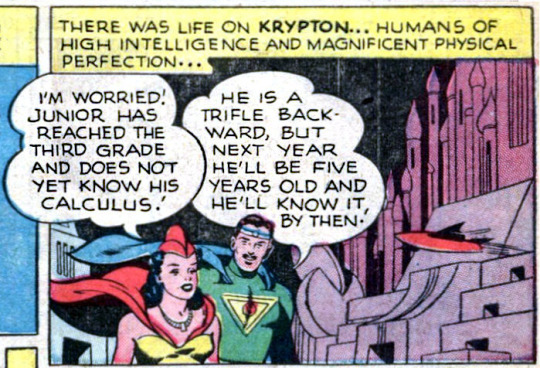
July-August 1948. Long before Supergirl donned her controversial headband, stories set on Krypton had regularly shown Kryptonian men wearing headbands. The above panel from SUPERMAN #53 is possibly the earliest example, at least in the comic books. Not all Kryptonian men wore headbands, but many did, including Superman's father, Jor-El. In 1973, an installment of the "Fabulous World of Krypton" backup strip finally offered an explanation of this unusual custom. This story, by Elliot S! Maggin and Dave Cockrum, is also one of the most distinctly Jewish-coded stories in the Superman canon. Let's take a look under the cut …
There had been flashbacks and time travel stories set on Krypton going back to the earliest Superman adventures, but "The Fabulous World of Krypton" strip first appeared in SUPERMAN #233 back in 1971. These backup strips, generally running between five and seven pages, ran fairly regularly through the early 1980s; the last was in 1982. While many were narrated by Superman, who often appeared at the beginning and end to provide a framing sequence, this one, from SUPERMAN #264, is noteworthy in that neither Superman nor Supergirl is even mentioned, save in the logo:
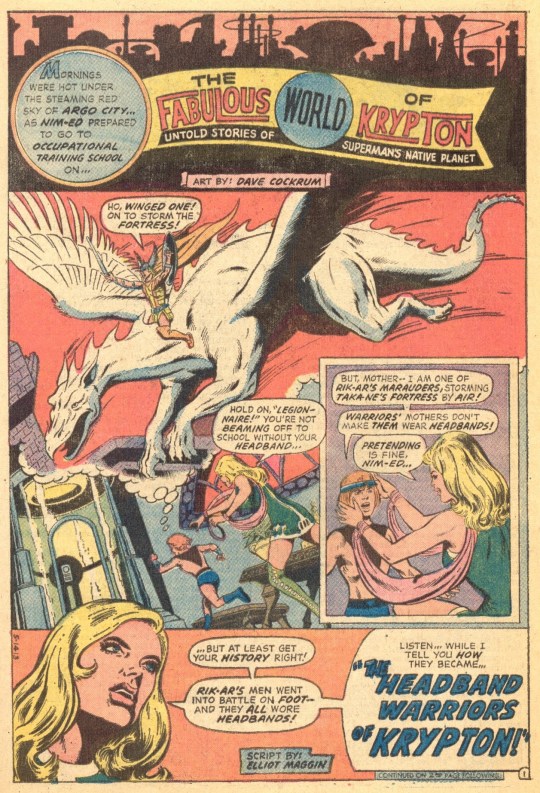
This story is set on Argo City, home of Supergirl. Although Argo City survived Krypton's destruction (in fact, in pre-Crisis history, Supergirl wasn't born until more than 15 years after Krypton exploded), the red sky in the first panel indicates that this story takes place beforehand. Nim-Ed and his unnamed mother were created for this story and never mentioned again; they're just ordinary Argonians with no particular relationship to any of the major Superman characters.
A noteworthy point here is that while Nim-Ed is shown to be on his way to school, the following account is a story related to him by his mother at home — it's a folk tradition, not an academic history, although since Nim-Ed obviously knows at least part of the story (and his mother implies that he should already know the rest), we can probably assume it's part of Kryptonian school curricula.
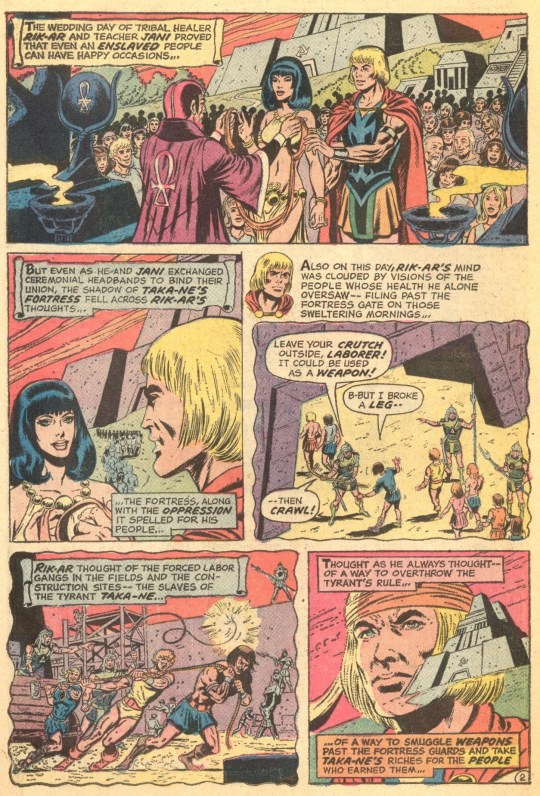
Exactly when this story is supposed to have taken place is vague. The pre-Crisis history of Kryptonian civilization spanned almost 10,000 Kryptonian years (over 14,000 Earth years); we only get snippets of it, establishing any kind of sequence of events is difficult, and it's not always clear how literally some of these stories should be taken. (For instance, an earlier installment indicates that all Kryptonians can trace their lineage back to two stranded space travelers named "Kryp" and "Tonn"!) However, if you've ever been to a Passover seder or watched THE TEN COMMANDMENTS, it's hard to miss the parallels here. ("When Krypton was [space] Egypt land …")
An intriguing detail is that we're shown that headbands were already worn prior to these events for a different cultural purpose: as part of marriage ceremonies. The origin of that custom is left to the imagination, but it obviously suggests a longer history of which this is only part. (One segment of THE KRYPTON CHRONICLES #3, published eight years after this story, indicates that the Kryptonian marriage ceremonies of an even earlier era involved bracelets representing Krypton's two original moons, which implies that the marital headbands may have been an evolution of that older custom.)
Note also the presence of the priest, which is relatively unusual: Pre-Crisis Superman stories were generally very cagey about discussing Kryptonian religious practice, although other stories indicate that earlier polytheistic traditions were eventually subsumed by a monotheistic system of belief based around Rao, previously a sun god whose name remained Kryptonians' name for their red sun. Where this priest and his ankh symbols fit into that progression is anyone's guess.
Note also that neither Rik-Ar nor Jani is any kind of warrior; Rik-Ar is a healer and Jani is a teacher.
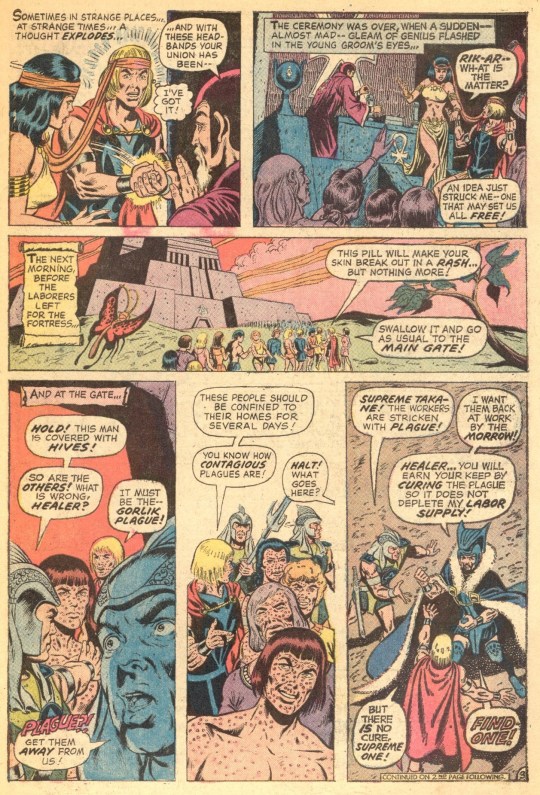
This bit of business with the fake plague doesn't make a great deal of sense, except to illustrate that Pharaoh, er, Taka-Ne, is a cruel tyrant who doesn't believe in sick days. However, many of these stories revolve around the characters contriving some kind of clever invention, and it's conceivable that editor Julius Schwartz insisted on it here. Also, Exodus involves 10 plagues, so perhaps Maggin figured a story that evoked the Exodus ought to have at least one.

The guards' reaction to the headbands is nonsensical: The guards saw the rashes themselves and were frightened of them, so why would they assume the plague was psychosomatic? Of course the point is that Taka-Ne doesn't really care so long as it doesn't trouble his slave labor force, but it's an odd digression.
Another point of note: ALL of the slaves are wearing the headbands, not only the men.
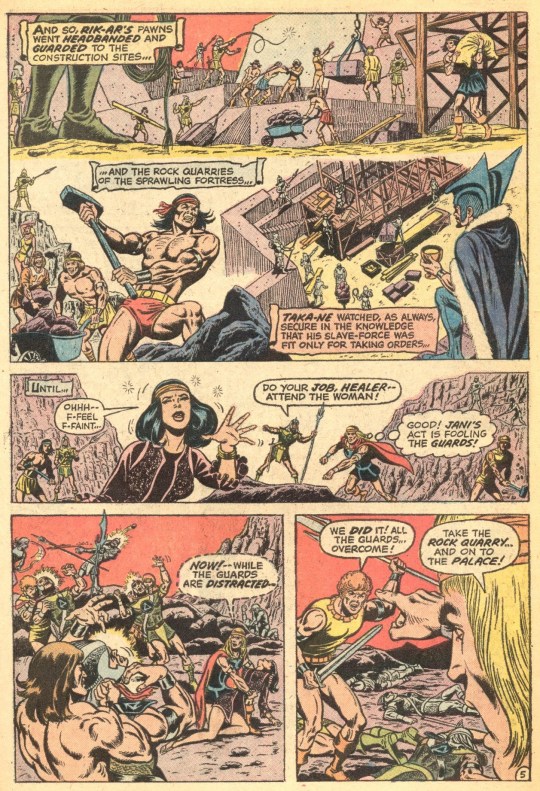
Here we segue from Exodus to Spartacus, as the slave laborers take their liberation into their own hands. For a Superman story of this time, this is unexpectedly violent, and it's a little surprising that all the strangulation passed editorial muster — comic book editorial standards of the time, not to mention the Comics Code, tended to frown on types of violence that readers might readily imitate, and this would seem to qualify.

Faced with the threat of imminent bloody retribution, Taka-Ne doesn't harden his heart, but seeks instead to cut a deal. The narrative captions would seem to emphasize that there's a lot of lethal violence taking place — not surprising in context, but unusual for a Superman story in 1973. Note that we see women as well as men attacking and presumably killing Taka-Ne's guards.
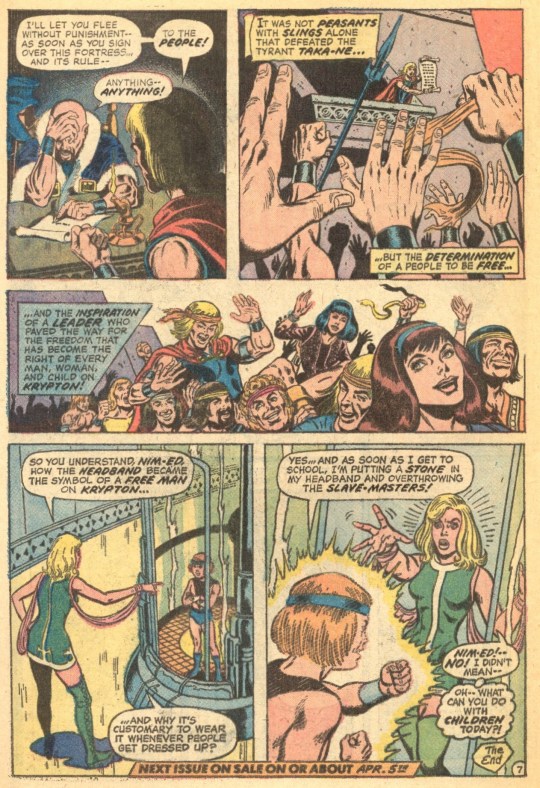
Note again that in the celebratory scenes, women as well as men are wearing headbands, just as we previously saw women using their headbands as weapons. However, Nim-Ed's mother then describes the headband as "the symbol of a free man on Krypton." The story she's just described took place thousands of years earlier, so the chauvinism of this tradition's modern practice presumably evolved in the interim. Combined with the fact that the headbands previously had a quite different ceremonial significance, it emphasizes that Kryptonian culture is not static, with such signifiers taking on distinct meanings at different times. In that light, Supergirl's later decision to adopt the headband herself makes perfect sense, representing both the liberalization of a current cultural practice (which is how she describes it in SUPERGIRL #17) and a hearkening back to the folkloric tradition from which it emerged.
This story doesn't delineate any specific cultural or tribal divide between Rik-Ar's people and Taka-Ne's, although it's clearly implied that the overthrow of Taka-Ne occupies a similar cultural space for modern Kryptonians as the story of the Exodus does for Jews and Christians. In that regard, it's also noteworthy that this is presented as the story of a secular liberation; it may also hold religious significance that's not mentioned here, but this is a cultural tradition rather than a specifically spiritual one. (The Adam Strange story in MYSTERY IN SPACE #76, also edited by Julius Schwartz, though written by Gardner Fox, presents a comparable historical liberation as part of the story of the foundation of Ranagar City, the home of Adam's girlfriend and later wife Alanna.)
Finally, the actual use of headbands among modern Kryptonians seems at least broadly analogous to the practice of wearing kippot (yarmulkes). Nim-Ed's mother's remark about wearing headbands to dress up might suggest that the headband is more comparable to a necktie, but that isn't really borne out by the stories in which the headbands appear, which show some Kryptonian men wearing headbands even in casual surroundings and others going un-headbanded in quite formal situations. Consider for example Jor-El's fateful meeting with Krypton's ruling council in SUPERMAN #53:

These are Krypton's highest officials in an official proceeding, and their garb otherwise seems quite dressy, but only Jor-El has a headband, so the choice to go headbanded seems dictated by something other than just the formality of the occasion. There's no specific indication that it's a matter of religious expression, but that would explain most of the variations in practice.
(It should be said, however, that headbands appear much more commonly in Bronze Age depictions of Kryptonian culture — particularly in stories published after "The Headband Warriors of Krypton!" — than in stories published in the 1950s or 1960s, and later depictions of the same events will sometimes show characters wearing headbands who were not in previous versions. However, there are still characters who rarely if ever wear one, including Superman himself.)
#comics#superman#the fabulous world of krypton#elliot s maggin#dave cockrum#krypton#kryptonian diaspora#supergirl#pre crisis#apologies for the slight blurriness of the first scan#the digitally recolored reprint of that 1948 story#inexplicably changes the original colors of the headbands and capes#so the original better served to illustrate the point#even if it wasn't the crispest#later reprints also tend to recolor jor-el's outfit#to better correspond with his later appearances
17 notes
·
View notes
Note
"...Mr. Wayne." A voice speaks. Someone with short blue hair, currently in a suit. "...I must ask...why do you stand against Luthor about the Kryptonians? I understand my family about it but....why do you?"
(Eaihan from @lightsoftime
I'm Jewish. Many of my people live in diaspora, and many more of them- my kin -are gone.
I am not so many generations far removed than I can fail to notice exactly what sort of person Lex Luthor is.
9 notes
·
View notes
Note
hi, I just read your ask about the "true kal-el/clark kent" and your answer about now it's reductive to try and pin him into one box or another when in truth he'd surely have a nuanced and potentially complex relationship to these two facets of his identity. really interesting and well-said stuff!
further to that, how do you see the constructed persona of Superman: Man of Tomorrow fitting in with this question of identity?
I know that in some stories the costume is/is inspired by kryptonian garb and in others it's not really, and that in some stories he uses the superman persona as a public outlet to live as a man from krypton while in others he tries to hide that side of himself from the public (although usually not for long, like in sstk) and I'd be really interested to see your take on how the superhero dual identity can relate to the immigrant dual identity
Thank you!! I'm glad people enjoy my musings about Immigrant Superman, haha. And this is another fun question! There's a ton of versions with how Clark comes to terms with the persona of Superman all with varying levels of a different diaspora Superman reading- personally I am really fond of the SSTK version.

Some versions have it so Clark is bestowed the Kryptonian clothes and House of El symbol, but in SSTK Clark gets the idea to present Superman as The World's Strongest Strongman, inspired by circus performers' colorful costumes in a deliberate move to look less intimidating.

Then we have Ma Kent sewing Clark's Superman costume, translating the "othering alien symbol" into a "S in a funny diamond shape", letting people interpret the symbol to mean the "S" in Superman. What I love about this version is we get to see Clark very relatable-y fear alienation and xenophobia by attempting to present himself as the most palatable, model-minority American Man ever. He doesn't debut as Kal-El the alien, he debuts as Superman! The Strongest Super MAN on Earth.

If this kind of Immigrant Superman characterization were to continue, I see Clark's relationship to the Superman persona as his outlet to be the approximation of so many identities that he can't quite have all the way. In the beginning of SSTK, Superman was his attempt to be the human approximation of an alien. Afterwards, once he's formally come out as an alien immigrant and can more comfortably showcase and explore his alien powers, the Superman persona becomes his means of connecting to Kryptonian culture. He's not going to emulate being a Born and Raised Kryptonian perfectly, since he's adopted and came to his alien roots later in his life- but his "S" was also a humanized translation of an alien symbol. His costume is now how the only representation (before Supergirl) of an extinct culture. Would he be able to communicate in Kryptonese perfectly? I'd like to think he struggles with it, as many migrants do with learning languages later in life- especially on their own.
Couple all this with the fact "Superman" is the public persona while "Clark Kent and "Kal-El" are his secret identities, makes his journey of connecting to his roots all the more complicated. Because he's doing all that reclamation of an extinct culture while the world watches.
That's how I see it anyway! I feel Superman characterizations that aim to make him "more scifi starting out" and embrace the alien side of him ("make the suit more scifi and less circus strongman!") to be lackluster because they're not taking advantage of Clark being a step removed from Krypton. How Clark presents Superman, from his mannerisms, to the outfit, the anxieties around his alien identity, and which powers he chooses to showcase is an opportunity to tell a compelling story.
#askjesncin#jesncin dc meta#i know there's versions of Clark learning a ton of languages or writers come up with wacky ways for Kara to know english already#but that's missing the opportunity for conflict with language barriers and showcasing that cultural disconnect#also a lot of ppl think Clark is J'onn. like mind powers are J'onn's thing- that makes sense for him
58 notes
·
View notes
Text
REC: Paintedqueen - All these things (that I'll never know)
URL: https://ift.tt/kPZcCw4 "It’s like a flip has been switched in his brain, making him uncomfortably conscious of Kryptonian status. Before, when he was younger and still so new to the world, it was the only identity he had, one of the few consistent facts about him.
There have always been two constant truths about Conner Kent.
Truth number one: He is Superboy.
Truth number two: Conner “Kon-el” Kent is a Kryptonian clone
And that's it. That's all there was to him. But now he's spent years desperately trying to find an identity, clawing onto anything he could have, to forge something that was just his. So much so that he's only thought about what he could become, not what he already was. And so in the darkness of his room, the moon shining through his open window, he considers what that means. "
----------
Or, Kon-El's journey on what it means to be Kryptonian. (Words: 12,796) !!!fandom, !!fic, |site:archiveofourown, +fandom:superboy.(comics), +fandom:superman.-.all.media.types, ::rating:general.audiences, ~author:paintedqueen, character:kon-el.|.conner.kent, character:kara.zor-el, character:clark.kent, character:jonathan.kent, character:cissie.king-jones, character:tim.drake, relationship:clark.kent.&.kon-el.|.conner.kent, relationship:kon-el.|.conner.kent.&.kara.zor-el, relationship:jonathan.kent.&.kon-el.|.conner.kent, relationship:jonathan.samuel.kent.&.kon-el.|.conner.kent, relationship:cissie.king-jones.&.kon-el.|.conner.kent, relationship:tim.drake.&.kon-el.|.conner.kent, relationship:tim.drake/kon-el.|.conner.kent, relationship:(implied), ::category:gen, \no.archive.warnings.apply, ~ao3:diaspora, ~ao3:kryptonian.culture.&.customs.(dcu), ~ao3:kryptonians.(dcu), ~ao3:trans.cissie.king-jones, ~ao3:not.mentioned.but.its.true.in.my.heart, ~ao3:cultural.differences, ~ao3:2nd.gen.immigrant.kon.el, ~ao3:kon-el.|.conner.kent.needs.a.hug, ~ao3:kon-el.|.conner.kent.is.superboy, ~ao3:self-esteem.issues, ~ao3:identity.
0 notes
Text

tags by @patogi
Absolutely all of this but also:
There’s a centra discussion about Superman as a character and as a person on who he is? Who does he think he is? What is he? The boy from Kansas? The Last Kryptonian? Clark Kent midly mannered reporter? Superman The Man of Tomorrow?
Much of Superman media, and especially the comics, does not center around this. When it does in many ocassions there isn’t a clear answer. In Injustice for instance he thinks about how humanity will never truly accept him because he is an outsider, but his child would be from earth and half human, they could be the change that he thinks he himself can’t be.
This show is focusing HARD on this question. In a previous episode Clark says he just wants to be normal. Now Lois tells him he could try to be that and you can see how it hurts him, because he thinks he can never be “normal”.
I think we can all agree that this show has moved past being “influenced by anime” it is clear a lot of it’s writing and characterization (not to mention designs) come from anime tropes. And in many anime various characters are confronted with this question too. You know what in many cases ends up being the answer?
“I’m both”
Not one or the other because neither is better and because that’s what people want you to be, but that’s not who you are.
And this speaks to the struggles of many immigrants. Being expected to be just the place they come from or just the place they live in. They’re hated for what they are and what they can’t or won’t be. Diaspora of all kinds get to a similar conclusion:”My experience is not just one or the other”.
I can’t tell you exactly where Clark’s character arc is gonna end on this show, but from what I’ve seem I’m willing to bet that they want him to recognize both his Kryptonian heritage (of which he knows NOTHING about yet,e xciting stuff) and his childhood in Kansas and see the value in both.
He is Clark Kent, he is Superman.
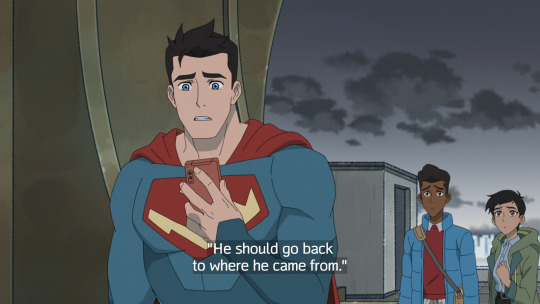
The way this is the story of an immigrant
6K notes
·
View notes